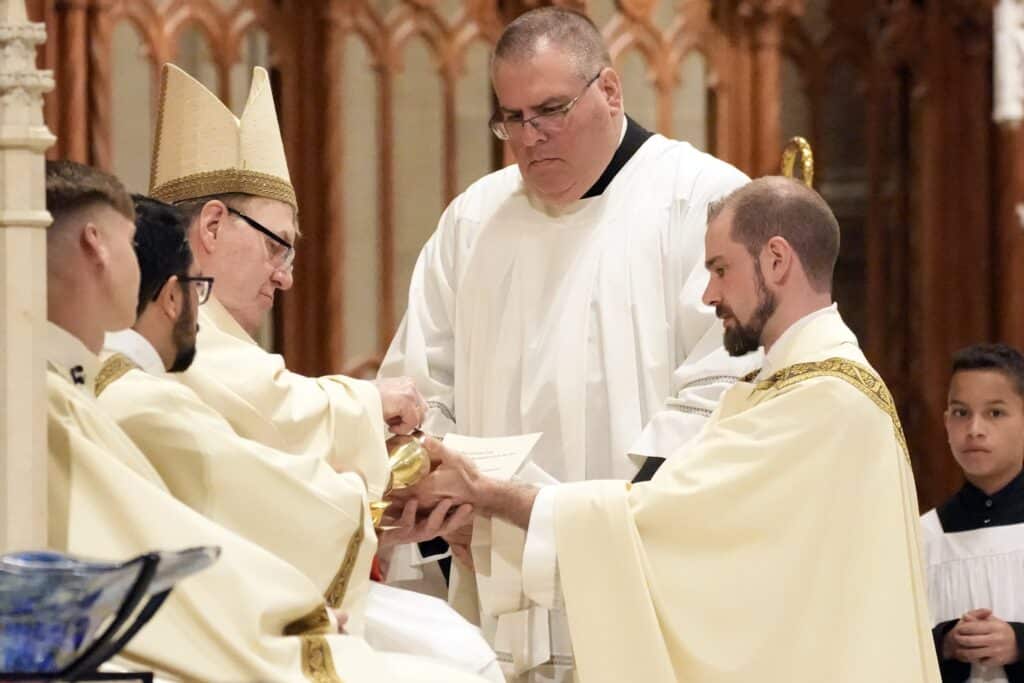A man had this question. He watched a priest baptize the man’s infant nephew. Why was the baby ceremonially touched with oil? Why oil, of all things?
Every Catholic has been anointed, oil placed on his or her body at baptism or at confirmation or, if seriously ill or injured, in the Sacrament of the Anointing of the Sick. Priests and bishops are anointed when they receive the Sacrament of Holy Orders.
In days gone by, monarchs were anointed.
Why? It helps to know something about oil as it occurred and was seen in biblical times.
In those days, artificially produced oil was not to be found. The Mediterranean world had many olive trees. Oil could be obtained easily by pressing, or squeezing, olives.
This oil was seen as medicinal. It was applied to wounds. No one knew how it worked, but the wounds usually healed. In scientific reality, the oil created a covering over the wound that bacteria and contaminants could not penetrate.
Athletes massaged their bodies with oil, and it apparently gave them strength. Nobody knew why. In fact, it loosened their muscles and joints.
Early Christians saw anointings as powerful in effect and highly expressive.
Oil, when applied, seemed to be absorbed, to enter the person. Being anointed by an authority meant being touched physically by the authority, sent on, and prepared for, a very important mission. Multiple New Testament passages call Jesus God’s “anointed.”
Oils used in the liturgy are ceremonially blessed, most often by the bishop in a magnificent ceremony, the chrism Mass, during Holy Week. (Only a bishop can bless the special oil that is called chrism.)
Recalling the days of Christ and the Apostles, sacramental oil must be drawn solely from olives. Modern artificially produced engine oil, or oil prepared for hair dressing, would never work.
Imbued with grace, sent on mission
Using oil in today’s liturgies, at baptisms, confirmations, ordinations and anointings of the sick, speaks the same lesson heard in New Testament times. Being anointed with holy oil, a person is healed, strengthened, imbued with the living presence of God, and sent on a divine mission.
The newly baptized, infants or adults, must survive in a world often ignorant of, or even hostile to, God. As disciples, they will have a purpose, to make the mercy, love and truth of Christ known and meaningful. Their souls must be strong, healthy and committed.
The newly confirmed enter the world, too often ugly with evil, prepared by God’s strengthening and insight to brighten that world with the pure, redeeming light of Christ. But challenges will be many.

At priestly ordinations, bishops anoint the hands of the candidates. Using their hands, moistened with blessed oil, the newly ordained priests hold what was merely bread, and a chalice once filled with wine, offering sacrifice and giving the body and blood of the Lord to God’s people. Lifting their hands, they sacramentally forgive sinners. Their hands pour water, and they baptize. Their hands bless, bringing God upon people and things. Their hands anoint the sick and the dying, give food to the hungry and drink to the thirsty, wipe away tears, point to the truth, and salute every human being as a precious child of God, for whom Jesus died on the cross.
Bishops, when ordained, are anointed on their heads, to show that they speak for the Church, and to pray that when they proclaim the Gospel and guide their flocks, the Holy Spirit will be in their thoughts and decisions.
Holy oil was placed on the breasts of kings, over their hearts, with the prayer that the merciful love of Christ would inspire their reigns.
Holy oils, when applied, truly imbue the person with God’s presence and grace, bestowed when the oil was blessed by the Church — protecting the person, healing the wounds of sin and strengthening him or her to serve the Lord in a holy mission.








